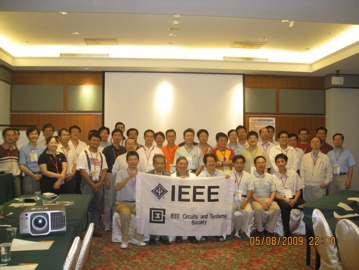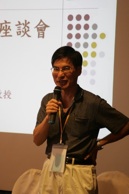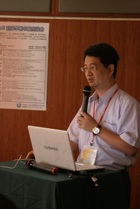

OPEN FORUM
Sharing 2009 Experiences on Innovative Mentoring in SoC Field in Taiwan
To continuously advance modern microelectronics especially in integrated circuits and micro-systems field, according to Business School principle four factors are very fundamental: talents, technology, capital, and land. The traditional factor on land can be replaced by distributed organizations in a global company with the connection of Internet. Still, talents play a prominent role in 21st Century.
In view of the paramount importance of talents, the National SoC (System-on-Chip) Program Office in Taiwan has organized a series of workshops to help nurture all-round professors and graduate students. In Dec. 2007, a Workshop on “How to be a significant contributor in international academic societies?” was held in Hsin-Chu City. In August 2008, a Panel session on “How to effectively mentor EE/CS university professors?” was held in Kentin Resort Center in southern Taiwan. In August 2009, a Panel session on “Pursuit of academic mentoring excellence in SoC field” was held in HuaLien City, at east coast area in Taiwan.

Photo (left): CASS Taipei & Tainan Chapters joint photos in the evening after the Panel on Aug. 5, 2009. (front row sitting from left) Prof. Ming-Der Shieh (CASS Tainan Chapter Chair), Prof. Chorng-Kuang Wang, Chair-Prof. Peter Wu (ex-VP of CAS Society), Honorary Prof. Bing Sheu (2000 President of CAS Society), Prof. Morris Ker, Prof. Tzi-Dar Chiueh, Prof. Shih-Chieh Chang (CASS Taipei Chapter Chair)
The 2009 Panel was organized by Dr. Bing Sheu, an Honorary Chair Professor at National Chiao Tung University and also 2000 President of IEEE Circuits and Systems Society, and by Prof. Wei-Zen Chen. The Panel was actually chaired by Dr. Liang-Gee Chen, a Distinguished Professor and also Associate Dean of EECS College at National Taiwan University. Chair-Professor Peter Wu (President of National Chiao Tung University, and also Principal Investigator in charge of National SoC Program) gave opening remark. The five outstanding panelists include: Professor Jinn-Shyan Wang (EE Chair at National Chung Cheng University), Chair-Professor Jhing-Fa Wang (ex-Dean at National Cheng Kung University), Prof. Chen-Yi Lee (R&D Dean at National Chiao Tung University), Prof. Shih-Chieh Chang (CS Department at National Tsing Hua University), and Professor Shen-Iuan Liu (EE Department at National Taiwan University).
(A)Opening Remarks

(B-1) Panelist Prof. Jinn-Shyan Wang

(B-2) Panelist Prof. Jhing-Fa Wang
Chair-Prof. Jhing-Fa Wang (IEEE Fellow) served as Dean of Engineering at National Cheng Kung University before. Currently, he serves as Founding Chair of IEEE Tainan Section. He takes more philosophical and religious approach. First, he describes an interesting analogy: “If fame is viewed as shadow, one can not catch the shadow completely. On the other hand, if one chooses to face the light to pursue true excellence, then the shadow will always follow automatically.” He emphasizes the importance of pursuing the ideal and the truth and not to be influenced too much by commercial product adoption or not. He advises the young faculty members, whether Assistant Professors or Associate Professors, to clam down the inner minds and to pursue the advances in fundamental research instead of counting how many SCI-indexed papers have been accepted for publication. Being close to retirement age, he tries to understand Buddhism to serve as ultimate guide for further progress. So, he shares the Six Paramitas (i.e., perfections, or reaching beyond limitation): Generosity, Ethics, Patience, Perseverance, Concentration, and Wisdom.
In terms of globalization leadership advances, Professor/Dean Jhing-Fa Wang refers to the speech content by Honorary Chair Prof. Bing Sheu at Dec. 2008 Keynote Speech to IEEE Tainan Section. First is to achieve steady progress in IEEE membership standing: from Student Member, to Member, and then to Senior Member. Some highly-established researchers will even be recognized as IEEE Fellows. Next is to actively participate at Technical Committees of IEEE CAS Society: to be a TC Member, or TC Secretary/Chair-Elect, and then TC Chair. For the Journal/Transactions, one can serve as reviewer, and then become an Associate Editor. In some special occasion, organizing a Special Issue as a Guest Editor is also highly encouraged.
(B-3) Panelist Prof. Chen-Yi Lee
Professor/Dean Chen-Yi Lee first highlights his observation that many prominent academic researchers in VLSI circuits in Taiwan are closely associated with the cities in central Taiwan. He quotes the examples of Chair-Prof. Peter Wu, Distinguished Prof. Liang-Gee Chen, etc. His personal choice of academic career is to fulfill his own dream. He suggests young faculty members to set suitable career milestones regarding promotion and also services. Once a person chooses the suitable topics to work on, he/she will make accomplishment and find satisfaction from the hard working. Most professors in Taiwan are in charge of a small Research Laboratory each. Thus, each professor functions as the CEO of a small team. How to leverage the strength and resource of the university will make significant difference to one’s research competitiveness.
In 21st Century, major paradigm changes have occurred in high-tech academia. Research results are published at faster pace than before, with many more conferences to present and more journals to publish at. Academic-industrial joint collaboration (or joint-development project, JDP) plays more important role than before. Increasing attention has been paid to research collaboration among multi-national teams (between Europe and Far East, or between U.S. and Taiwan, etc). Active participation at large programs is one viable solution for 21st Century. For example in Hsin-Chu City area, there are several large programs related to integrated circuits and micro-systems field. These include: National SoC Program (NSoC) Office, National Nano Devices Laboratory (NDL), National Chip Implementation Center (CIC), Instrument Technology Research Center (ITRC), National Space Organization (NSPO), and National Center for High-Performance Computing (NCHC).
(B-4) Panelist Prof. Shih-Chieh Chang
Professor Shih-Chieh Chang presents from a very different angle, especially speaking for the truly young faculty members such as Assistant Professors or Associate Professors. He suggests not to blindly attempt to duplicate the work model of the well-established professors: about student recruiting, funding competition, etc. He specifically outlines 5 DON’Ts.
(1) First, do not engage into diverse short-term topics (due to promotion pressure). According to him, diverse short-term topics are with the following characteristics: with low entry barrier, many competitors, incremental improvement, and low visibility. In contrast, long-term and focused research can make high impacts.
(2) Second, do not stick to a topic without intermediate objectives/milestones. One should organize the research efforts into separate short projects. If the effort shall fail, it is better to know soon (at the proper check points). Good research topics shall possess the following properties: Topics have proper entry barrier. Topics can be extended in many directions. Topics are identified with help from industrial collaborators instead of being a generic mathematical problem. Do not be afraid to step into a new direction. Successful prototyping is encouraging and exciting. Do “real stuff”, i.e. solve the problem that someone really cares about.
(3) Third, do not totally rely on graduate students’ results for one’s promotion/tenure. Professors from overall the world are competing for quality students. Spending too much time in training the Master-Degree students might not be rewarding in terms of advanced research because the student can switch school in pursuing Ph.D. study. Instead, the young faculty member shall prove and enhance his/her own research ability.
(4) Fourth, don’t think you are a small potato. In fact, university faculty positions are highly respected, with suitable amount of annual research funding in Taiwan. Thus, the faculty member shall function as CEO of a small company: not only conducting research and development, but also on marketing and sales. The faculty member shall have a long-term plan to achieve excellence.
(5) Fifth, don’t worry too much at the beginning. High impact research requires clear, calm, and long thoughts. The faculty member shall be calm and relaxed, to have a balanced work-and-life. Try to develop a hobby to relieve the stress.
The above suggestions can be re-grouped as:
In selecting research topics: Do not engage into diverse, quick, short-term research topics. Do not stick to a topic without intermediate objectives/milestones.
In student training: Do not totally rely on students for one’s promotion/tenure.
In attitude: Do not think one to be a small potato, and do not worry too much.
In terms of global competitiveness, the key is to achieve: Visibility, Recognition, Cooperation, Service, and Community Involvement.
(B-5) Panelist Prof. Shen-Iuan Liu
Professor Shen-Iuan Liu is very humble. He starts with the suggested basic training at graduate study (imagine that he were 20 years younger). First is to strengthen the language ability in order to make direct influence at international meetings. Second is to enhance the logic reasoning and presentation skills in order to deliver the results in most-effective and least-painful manners. The third is to keep great health in order to meet the demanding job of being an active faculty member in EE/CS field. The fourth is to master one’s own life, to set the proper pace with carefully chosen milestones. Life is full of give-and-take. Do not expect to “win” all the time.
Next, he gives suggestions to fresh Ph.D.s, i.e. the starting Assistant Professors. First is to be aware of the available resources: from the university, from the governmental agencies, from the foundations, and from the industry. Second is to be familiar with the thinking of worldwide leading Masters in the given field. The third is to focus and attempt to do good branding. Avoid spreading out thin over too many topics. The fourth is to be persistent, but with learning capability in order to take advantage on lesson-learnt. Then, try to foster an impressive vision for the future (with a proper “business model”).
Professor Shen-Iuan Liu is very optimistic about the next several years in his own career development. At the individual researcher level, he feels that adoption of better philosophy and methodology can carry it through. At the university level, he feels that large organizations such as National SoC Program (NSoC) and National Chip Implementation Center (CIC) can provide the additional supports/help. At the governmental level, he feels that the 5-Year/50-Billion (New Taiwan Dollars) Grand Program is the right initiative for the 21st Century.
(C) Lesson-Learnt
According to Professor Jeng-Neng Hwang, successful mentoring of young faculty members is an integral portion of the duty of a senior professor, and included in annual evaluation of the senior professor at his home department EE at University of Washington, Seattle. However, mentoring of young faculty members by the senior professor in Far East is not a norm yet. In Taiwan, it is done on voluntary basis with very different effort levels and thus different results from case to case. The 2009 Panel session on “Pursuit of academic mentoring excellence in SoC field” represents one major step forward in a systematic approach.
As a follow-up, the National SoC Program (NSoC) Office has decided to launch a pilot initiative “Distinguished Lecturers in Mentoring”. Honorary Chair Professor Bing Sheu (IEEE Fellow), Professor Wei-Zen Chen, and Professor Morris Ming-Dou Ker (IEEE Fellow) are appointed to handle this pilot initiative. In addition, Professor Shih-Chieh Chang (CAS Taipei Chapter Chair) and Professor Ming-Der Shieh (CAS Tainan Chapter Chair) are invited to make the direct contributions as well. We intend to report the progress at CAS Society Newsletters in not-too-far future.
Bing Sheu* (Email: bing_sheu@tsmc.com), Liang-Gee Chen+, Wei-Zen Chen* and Peter Wu*
*National Chiao-Tung University, +National Taiwan University
